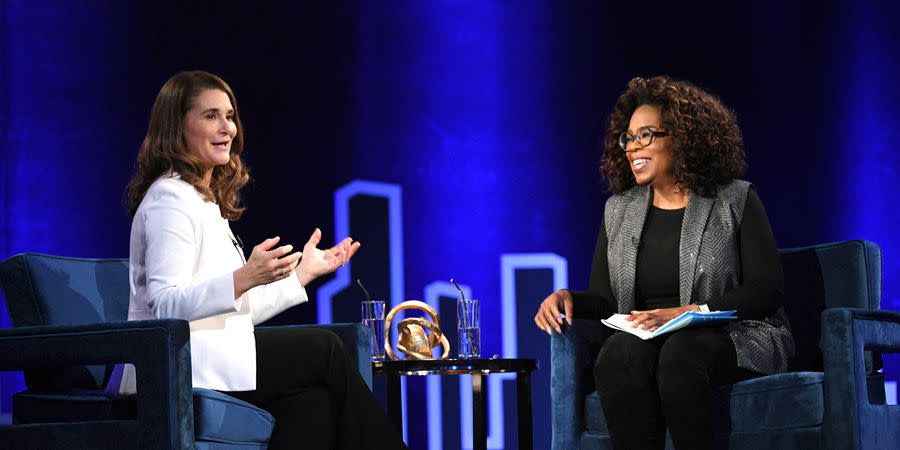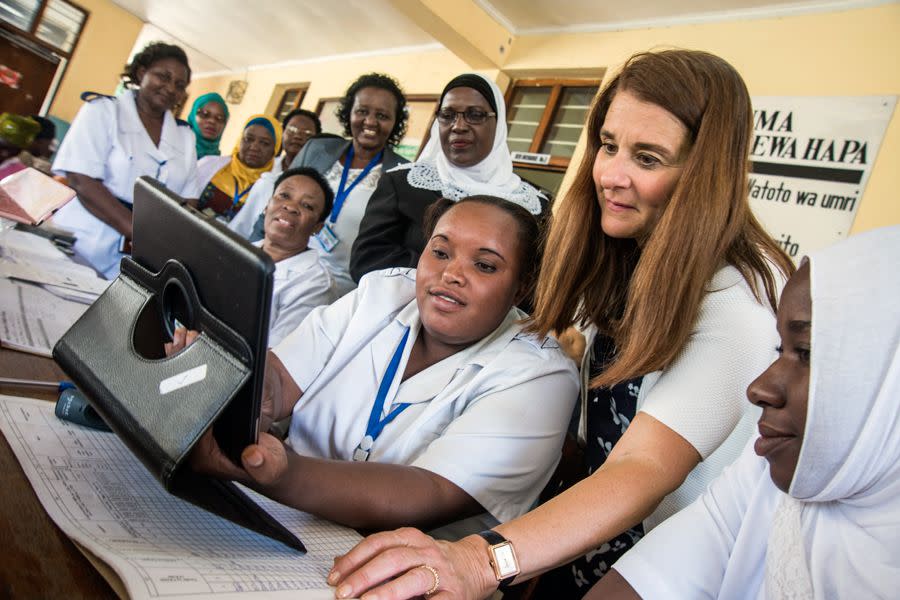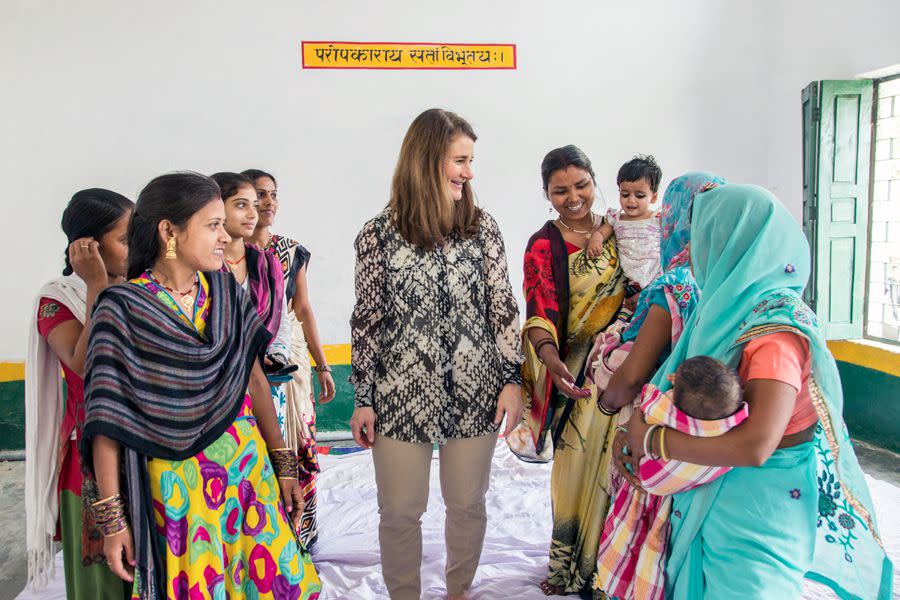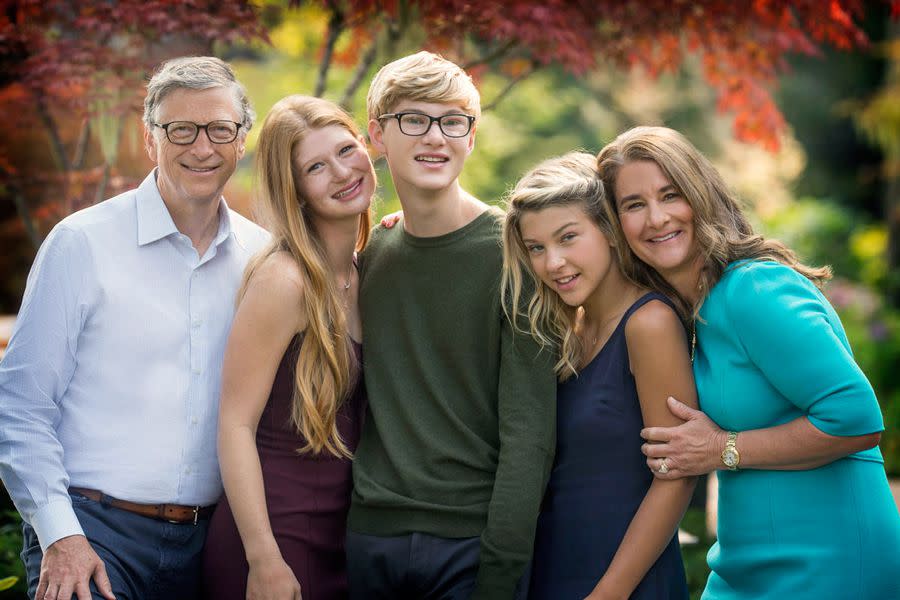Melinda Gates Tells Oprah Why She Works Hard Every Day Despite Her Wealth

It’s impossible not to be impressed by the dedication mega-philanthropists Bill and Melinda Gates have shown in their efforts to eradicate inequality and the effects of poverty, but until I read The Moment of Lift-Melinda Gates’s wake-up call in book form-I didn’t fully grasp the depth of their knowledge and their passion, not to mention what it took for Melinda to go from wife, mom, and concerned private citizen to one of the world’s leading advocates for female empowerment.
Many of the stories Melinda relates are about the people she’s met in her travels, and how “conversation accelerates change.” She says that learning to feel what others feel made her “see what they see.” She’s witnessed radical feats of resilience, kindness, and courage everywhere she’s gone. Still, for all the intimacy and inspiration the book delivers, it’s at times a sobering read.
We learn that even today, more than 130 million girls don’t get to attend school. Complications during pregnancy and childbirth remain the leading causes of death among girls age 15 to 19. And while the number of people living in extreme poverty has declined, more than 700 million of us subsist on the equivalent of $1.90 per day. I had so many ahas while reading The Moment of Lift, I had to get out my highlighter. Then I needed to sit down face-to-face with the author and learn even more-which I did on a New York City stage earlier this year.
Before we get to all the OMG moments in your book, let’s address the elephant in the room. When your name is mentioned, people immediately think money. They think, Her problems aren’t like mine because she can pay to make hers go away. “Great wealth,” you write, “can inflate and distort your sense of self-especially if you believe that money measures merit.” Is it even possible to sit in the space of so much wealth and know that to be true?
I guess I just don’t see myself as different from anyone else. I grew up middle-class in Dallas. The whole family worked very hard to save enough to send the four of us kids to college. We knew my dad’s engineer salary wasn’t going to pay for all of it, so my parents started a little real estate business on the side. My siblings and I helped with stuff like cleaning houses and keeping the books. And my parents sent me to an all-girls Catholic high school where I learned about social justice-about the need to stand up for causes and principles, and for those who had less than we did.
You went to work at Microsoft after getting your MBA and one day found yourself seated next to Bill Gates at an event. I love that when he first asked you out, it was for a date two weeks from that day-and you told him that wasn’t spontaneous enough for you. So he called you two hours later and said, “What about tonight?” He’d met his match!
That, and I could beat him at math games and Clue.
I was struck by the fact that even before the two of you married, you were already talking about how to do something meaningful with your money.
Both of our families had taught us to give back-we had that in common. My mom and dad did community service work through the Catholic church, and the Gateses were active in philanthropic causes in Seattle.
It was on a safari to Africa in 1993 that you worked out where you would commit your resources, right?
Yes. We took our first trip to Africa a few months before our wedding. Of course, we were awed by the animals and the beautiful landscape. We loved all that, but what really stuck with us were the human scenes: a mother who was carrying a baby in her belly, another on her back, and a pile of sticks on her head. She’d clearly been walking a long distance with no shoes, while the men we saw were wearing flip-flops and smoking cigarettes with no sticks on their head or kids at their side. We observed similar dynamics everywhere we went, and also we couldn’t get over the disparity between what we were going home to and what people there were living without.
You write about a walk on the beach during which you decided what?
That we were going to give away the vast majority of our resources to address some of the problems we’d observed.
When you have so much money and know there are infinite problems out there, it’s easy to get overwhelmed. Especially in Africa, the temptation is to throw up your hands-you just don’t know where to begin.
And as you know, we’re talking about vastly different countries with multiple cultures within each. Our approach was to first gather experts to advise us on the role of philanthropy. In terms of focus, what we kept coming back to was the simple fact that millions of children were dying because they were poor. Saving as many of those lives as we could became the goal. But we weren’t the government, so how ambitious could we be in terms of scale, even with our billions? Where could we have the biggest impact? Coming out of the tech sector, we were drawn to the ways science and innovation could make an enormous difference.
How did you decide vaccines would be the cornerstone?
Return-on-investment-wise, vaccines have a huge payoff. If you can get a vaccine in a child’s arm in Africa, it can literally save his or her life.
You learned it took 15 to 20 years for vaccines readily available here or in Europe-hepatitis B, for example-to make their way to Africa, and in that interval, millions died.
They were dying needlessly from diseases our kids don’t have to worry about or are inoculated against. If you believe, as we do, that all lives have equal value, that can’t be allowed to stand.
And then you tackled women’s contraception.
The more I traveled to see how the vaccination programs were going, the more I realized that the lack of access to contraception was also a life-and-death issue for women and their families. In Malawi, I remember asking a young mother with small kids, “Are you taking these beautiful children to get their shots?” “What about my shot?” she asked me. She was talking about Depo-Provera, a birth control injection that was commonly used in Africa to prevent pregnancy but had become very difficult to get. This came up again and again the more I spoke to women in Africa and parts of Asia-especially after I learned that if I wanted women to tell me what was really going on in their lives, I needed to wait for the men to go back to work in the fields and leave us to speak openly.
You started asking how many of them knew someone who’d died giving birth.
And usually three-quarters did. When I asked how many knew someone who’d lost a baby in the delivery process, they’d all raise their hands.

And many felt that continuing to have children was endangering the future of the kids they already had.
A woman from Niger, Sadie, told me she had six children. Her youngest was next to her. “Don’t you understand,” she asked, pointing to the small piece of arid land they lived on, “that I can hardly feed these children?”
How did you respond?
When I first started, I wanted to turn away, to say I’m here to talk about vaccines, not birth control. It took me a while to absorb the urgency of it.
When you brought it to Bill’s attention, what was his take?
Bill is very data oriented, which is a huge gift, but when I raised the subject with him, he said, “Melinda, contraceptives are stocked in.” When I looked at the reports, I saw that yes, most of the clinics were well supplied with condoms, because of HIV/AIDS. But as women all over the developing world have told me, they cannot negotiate condoms, even in their own marriages, because that would be like suggesting their husbands have been unfaithful and may be infected with HIV, or that they, the wives, have been.
When a woman can’t control the size of her family, it can leave her feeling desperate. You’ve met mothers who are so beaten down, they’ve asked you to take their children.
Yes, like the time I was visiting a clinic in northern India and met Meena, who’d just had another child. She was breastfeeding him as we spoke.
You were having a lovely conversation until you asked her if she wanted more children...
All of a sudden she cast her eyes down and was silent. I thought I’d made a faux pas, but eventually she looked at me and said: “I can’t have more children-I don’t have any hope for the ones I have. Their only chance is if you take them home with you.” That crushed me.
Somebody says “Take my two boys”-what do you say to that?
I begged her forgiveness. I told her I was sorry, but I had three children at home-I just couldn’t.
But that was a turning point. You began to see every wall as a door.
She spoke a harsh truth, which took courage, and her pain burned its way into me. I finally really heard what so many women had been telling me. There was a wall that needed breaking down, so we could walk through it together.
But even after you got it, you worried about the controversy you’d get drawn into with conservatives and Catholics and people who thought you should just stay out of it.
The church tells you “Thou shalt not use contraceptives,” but I had to remind myself that my kids are three years apart-so obviously I’m using them. When I dug deeper, I found that the vast majority of Catholic women in the U.S. use birth control. And in any case, would I really let people die because of a religion I was raised in?
And then you had to find the courage to lead on the issue.
Yes, it meant taking a public position and saying: I use contraception. I have sex with my husband. I had to find the strength to be open and to stand on behalf of other women.

And you were moved to act by letting in their pain.
Yes, it’s so important to let my heart break.
I’ve been one of those people who wants to resist the heartbreak you’re describing, to push it away. But if you let your heart break and allow that to guide you to action, you can create a moment of lift.
You have to let it move through you and eventually metabolize, and then ask yourself, What action is this calling me to do?
It called you to raise $2.6 billion and launch a global coalition on family planning! On page 173 of the book, you write: “The starting point for human improvement is empathy. Everything flows from that.” I agree with you. We’re all so disconnected, and it’s chipping away at our humanity-it’s at the root of so many problems.
Empathy leads to listening, and listening leads to understanding.

You mentioned wanting to be an example for your children. How do you raise kids who are responsible and kind, who grow up with a sense of grace and yet have their own ambition-when they have access, literally, to anything they want? I grew up poor. When my mother said we couldn’t afford something, I knew we couldn’t. But you can never say that to your kids.
I’ve wrestled with that. But just because you can get it for them doesn’t mean you should. Our kids see Bill and me work very hard. We don’t have to, but we do-every single day. They’ve also been fortunate to travel, from early ages. They’ve slept right next to us in goat huts in poor villages in Tanzania, walked miles to fetch water, cut wood with dull machetes, learned that a farmer’s pig is how he’ll pay for a son’s education. They see how others live and know they are lucky to be who they are and to have grown up in the United States.
What is your hope for your children?
To find whatever it is that is their talent and to use it on behalf of the world.
Instead of making New Year’s resolutions, you choose a single word to bring you guidance for the next 12 months. For example, you’ve chosen gentle to help you fight perfectionism. You’ve also picked spacious as a reminder to make room for things in your life. In 2018, it was grace, to signify that you’re part of something bigger than yourself. Do you have a 2019 word?
I do. I have to say it feels very vulnerable to share this. It’s shine.
Ah.
It’s not about me, it’s about believing that every person has a light inside them. Every single person. If we can turn those lights on-on behalf of women, on behalf of those who don’t have as much as we do, on behalf of minorities in our own country-and stand up for what’s right, we will break through. We’ll all shine. The world will shine.
For more stories like this, sign up for our newsletter.

